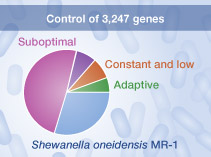 It is generally thought that bacteria regulate gene expression to adapt to changes in their environment. This implies that genes are expressed only when they are needed and are otherwise turned off to avoid producing proteins when they are not required or are toxic. A new study by Arkin and colleagues challenges this view of adaptive regulation of gene expression and shows that in bacteria grown in the laboratory, there is little correlation between when genes are important for fitness and when they are more highly expressed. Most genes thus appear to be regulated by signals that are not related to their function.
It is generally thought that bacteria regulate gene expression to adapt to changes in their environment. This implies that genes are expressed only when they are needed and are otherwise turned off to avoid producing proteins when they are not required or are toxic. A new study by Arkin and colleagues challenges this view of adaptive regulation of gene expression and shows that in bacteria grown in the laboratory, there is little correlation between when genes are important for fitness and when they are more highly expressed. Most genes thus appear to be regulated by signals that are not related to their function.
Price M.N., Deutschbauer, A.M., Skerker, J.M., Wetmore, K.M., Ruths, T., Mar, J.S., Kuehl, J.V., Shao, W., Arkin, A.P. (2013) Indirect and suboptimal control of gene expression is widespread in bacteria. Molecular Systems Biology 9:660 doi:10.1038/msb.2013.16
